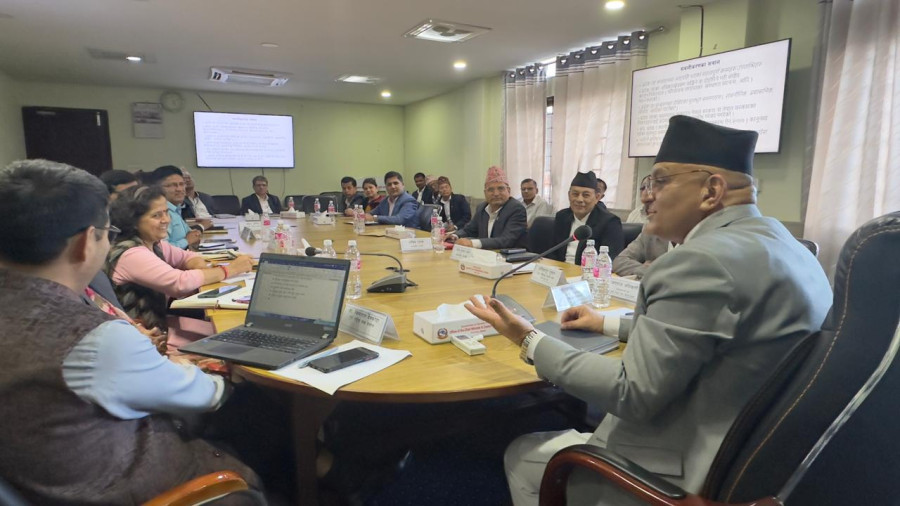Columns
CMs’ insights on federalism
They highlight the urgent need for reforms in Nepal’s federal system.
Khim Lal Devkota
In the past two weeks, the Federalism and Localisation Centre organised interactive programmes with chief ministers, ministers, political party leaders, principal secretaries and secretaries, and other key officials from Koshi, Madhesh, Bagmati and Gandaki provinces. Today, the Centre is organising a similar programme in Lumbini Province. This article summarises the key insights shared by the chief ministers during these discussions, focusing on three key areas: Provincial government achievements, challenges in federalism, and necessary reforms, including issues related to constitutional amendments.
During a session in Pokhara, Chief Minister Surendra Raj Pandey stressed that the federal governance system cannot be effectively institutionalised without a significant shift in the mindset of political leaders. He recounted how he coordinated with then-Prime Minister Pushpa Kamal Dahal to convene a meeting of the National Coordination Council in July 2023, but lamented that the meeting yielded no meaningful outcomes. Although the meeting made six decisions to clarify the rights of all three tiers of government, Chief Minister Pandey pointed out that none have been fully implemented.
According to him, while former Prime Minister Dahal was genuinely committed to federalism, many other leaders did not share the same dedication. Despite Dahal's commitment, the momentum for federalism stagnated during his tenure, as attempts were made to centralise power instead of promoting federalism. Pandey argued that it is unproductive to blame bureaucrats for the stagnation of federalism; rather, the real issue lies in a lack of political will. He mentioned that although the Madheshi and Maoist parties initially drove the federalism movement, political parties must now clearly articulate their stance if constitutional amendments are needed.
Pandey asserted that provinces are the most crucial innovation of federalism, though opposition has emerged due to internal provincial issues and resource allocation. He stated, "If we fail to deliver services, we must reassess our approach. Criticising us without the chance to perform is unfair. The federal government often does not pass necessary laws, yet we are held accountable." Engaging with nearly 100,000 people annually, he highlighted that this is a direct result of federalism. He called for a shift in political attitudes and expressed concern about provincial employees and police not being under provincial control, limiting governance potential.
Chief Minister Hikmat Kumar Karki of Koshi Province shared similar sentiments about the state of federalism in Nepal. He highlighted a concerning trend: Political leaders who once served at the provincial level often forget the challenges provinces face when transitioning to the federal government. "Many who were once in the provinces during their first term are now at the federal level, but they seem to have forgotten the struggles and concerns of the provinces," Karki noted. He also addressed alarming calls to abolish federalism and eliminate provinces, attributing such views to a centralised mindset.
Karki urged those drafting the constitution to take responsibility for its implementation, emphasising the need to prioritise federalism and constitutional reinforcement. He dismissed claims that integrating civil servants and police into the provincial system is impossible, warning that undermining federalism could lead to renewed conflict. "If federalism is abolished, a new constitution may emerge, but it will only push Nepal towards further turmoil," Karki cautioned. Instead of dismantling the current federal structure, he advocated for addressing its flaws, noting that provinces operate with limited authority that must be expanded.
Karki questioned the need for 25 federal ministries, suggesting that only essential ones like the Prime Minister’s Office, Finance, Defense, Home Affairs and Foreign Affairs should remain at the federal level. He criticised the disparity in resource allocation, noting that 80 percent of government employees are at the federal level, while the combined budgets of all seven provinces fall short of a single federal ministry's budget. To address this, he proposed a revenue-sharing model, with the federal government receiving 30 percent of revenue and provinces and local governments each receiving 35 percent.
Karki expressed dissatisfaction with the Fiscal Commission's performance, stating it has not followed the constitutional spirit. He also highlighted the challenges of administrative federalism, where many civil servants resist transfers. Despite these issues, Karki acknowledged progress in infrastructure development but lamented the lack of communication and advocacy for federalism.
In Madhesh Province, there is a growing recognition that meaningful federalism can only be realised if the federal government allows provinces to exercise the rights guaranteed by the constitution. Concerns have been raised about the federal government's reluctance to grant constitutional rights to provincial governments under various pretexts, hindering the institutionalisation of federalism.
During a dialogue on strengthening federalism held in Janakpur, Chief Minister Satish Kumar Singh highlighted positive developments in sectors such as education, health and infrastructure since the establishment of federalism. He cited these advancements as having significantly transformed the rural landscape of Madhesh, underscoring the tangible benefits of provincial governance.
Despite limited rights and resources, Singh highlighted the provincial government’s commitment to establishing essential infrastructure and mechanisms for the benefit of the people. He noted that the effective roles played by provincial and local governments during the Covid-19 pandemic were crucial in saving countless lives. Singh cautioned that relying solely on the federal government during such crises would have led to dire consequences, further reinforcing the importance and relevance of federalism.
While acknowledging that the rights granted to provinces are insufficient, Singh said that the provincial government has shown its presence by undertaking necessary tasks even in areas beyond its jurisdiction. For instance, despite lacking authority over basic education, the provincial government has initiated school infrastructure development. He highlighted the critical issue of the teacher-student ratio in Madhesh Province, where one teacher serves 40 to 45 students, compared to the standard of one for every 20 to 22 in the hills, raising concerns about education quality.
Singh noted that 80 percent of government employees are concentrated in Singha Durbar, fostering a perception that provincial workers are penalised. He criticised the federal government's maintenance of 25 ministries, arguing that only five to seven are necessary, especially with existing provincial ministries. Singh stressed the importance of addressing flawed practices while advocating for provincial rights. He warned that if actions undermine the future of federalism, Madhesh Province would not remain silent. Calling for unity among political parties against attempts to weaken federalism, he emphasised that collaborative efforts are essential for strengthening governance in Nepal.
Chief Minister Bahadur Singh Lama of Bagmati Province expressed serious concerns about the ongoing challenges the provincial government faces, particularly due to the lack of control over police administration. He underscored that a government without effective police oversight is fundamentally flawed. "While a government may exist, its significance diminishes without a functional police administration," he stated.
The relationship between the federal and provincial governments has been strained for some time, especially regarding police integration and civil service legislation. In light of these challenges, Bagmati Province has proactively constructed police facilities and established relevant laws. However, unresolved issues surrounding police integration continue to hinder effective governance.
He acknowledged that while some changes have occurred since the implementation of federalism, they do not align with citizens' expectations. "The hopes and desires of the people are substantial; however, managing these aspirations with current resources presents significant challenges," he explained. Chief Minister Lama assured attendees that the provincial government is prioritising issues outlined in the list of exclusive rights mandated by the constitution, stating, "To date, we have enacted 80 laws that address the needs of our province."
Lama emphasised the urgent need for improved coordination among provincial, federal, and local governments, identifying this as a primary challenge. "Developing the necessary laws to facilitate effective collaboration among the three tiers of government is essential. Failure to do so will lead to public dissatisfaction."
The insights shared by the chief ministers highlight the urgent need for reforms in Nepal's federal system. While progress has been made, significant challenges remain.




 13.58°C Kathmandu
13.58°C Kathmandu















